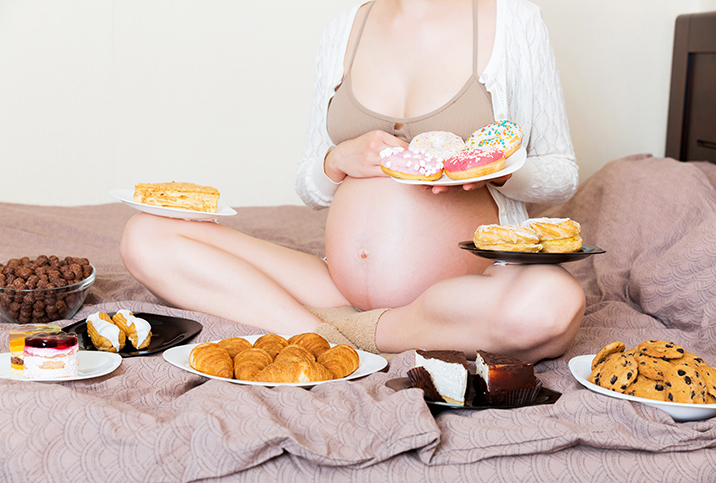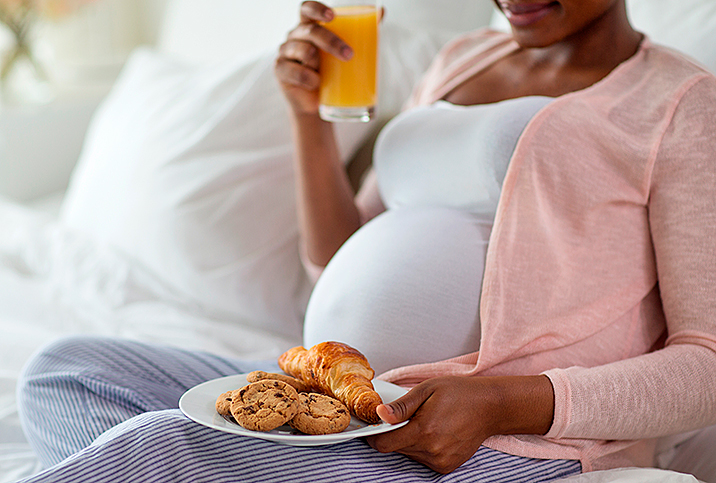What You Need to Know About Heartburn During Pregnancy

Pregnancy can unleash a host of uncomfortable symptoms. First, there's morning sickness. Then swollen feet and skin issues. Heartburn is also a common pregnancy symptom. Though chest pain during pregnancy is understandably frightening, it rarely indicates a serious health problem.
"Heartburn, despite its name, has nothing to do with the heart. It's a burning feeling in the throat and chest when the stomach's contents move back up into the esophagus," explained Jane L. Frederick, M.D., a reproductive endocrinologist and medical director of HRC Fertility in Newport Beach, California.
Between 17 percent and 45 percent of pregnant people experience heartburn, according to a 2015 research review published in BMJ Clinical Evidence. Fortunately, most sufferers find relief soon after delivery.
What causes pregnancy-related heartburn?
There are many reasons you might experience burning chest pain while pregnant, according to Jennifer Lew, M.D., an OB-GYN at Northwestern Medicine Kishwaukee Hospital in DeKalb, Illinois.
"In the first trimester, the stomach is emptying slower," Lew explained. "This, along with the increase in nausea and vomiting due to pregnancy, increase[s] the occurrence of heartburn."
Frederick and Lew said pregnancy hormones can also relax the esophageal sphincter, a muscular valve between the esophagus and the stomach. When it softens, acidic gastric juice can back up into the esophagus, causing painful burning in the middle of the chest.
Heartburn can also intensify in the second and third trimesters when the growing uterus presses up on the stomach, Frederick noted.
When heartburn is a sign of something serious
Though heartburn is a common symptom of pregnancy, you should alert your doctor to intense pain or a sudden increase in symptom severity. Lew said heartburn combined with blood-tinged vomit or phlegm can indicate gastric bleeding.
Mallory-Weiss syndrome, a type of gastrointestinal bleeding sometimes caused by violent vomiting, is a rare but serious possibility during pregnancy. Heartburn alone is unlikely to indicate Mallory-Weiss syndrome. You would also experience other symptoms, such as:
- Bloody vomit
- Vomit that looks like coffee grounds
- Bloody poop
- Unusual weakness and fatigue
- Shortness of breath
Though rare, gastrointestinal bleeding needs to be treated immediately. If your heartburn is accompanied by symptoms of bleeding, call your OB-GYN or primary care physician as soon as possible or visit the emergency room.
Treating heartburn during pregnancy
Regardless of when or where heartburn strikes, popping an over-the-counter antacid should be your first move, Lew advised. Antacids relieve the burn by neutralizing stomach acid. Though antacids offer almost instant relief, they do little to prevent future heartburn.
For next-level treatment, Lew suggested famotidine (such as Pepcid AC), an over-the-counter histamine-2 receptor blocker that can be taken once or twice daily.
"After this step, further treatment should be directed by the provider because there are other prescription medications that can be helpful," she added.
It's important to be cautious with medications while pregnant.
"Talk with your doctor about medication[s] that are pregnancy-safe," Frederick advised.
That means avoiding medicines such as Bismuth subsalicylate (Pepto-Bismol) and Alka-Seltzer, which Lew said should not be used during pregnancy.
How to prevent heartburn during pregnancy
Experts say lifestyle and dietary modifications are the first line of defense against pregnancy-related heartburn.
Treating your digestive system gently is essential. Avoid acidic foods such as citrus fruits and hot peppers. Savor meals slowly to keep from overloading your stomach, especially on days when you feel the burn.
"Eat several small meals throughout the day," Frederick advised. "Drink liquids between—not during—meals."
Aside from well-known dietary triggers, such as spicy food, the doctors we spoke with recommended avoiding the following:
- Fatty foods, such as fried food, full-fat dairy products and fatty cuts of meat
- Carbonated beverages
- Caffeine
- Chocolate
- Alcohol—"No alcohol ever in pregnancy," Lew reminded.
The time of day you eat matters, too. To prevent nighttime heartburn, Lew suggested not eating within three hours of bedtime.
While there's no harm in kicking up your feet during the evening, keep your torso upright. This helps gravity work in your favor by encouraging food and gastric acid to stay down in your stomach rather than migrating up into your esophagus. Once you go to bed, sleep with your head elevated above your chest.
Remember, if you have concerns about pregnancy-related heartburn, talk to your doctor. They can help you find the best solution for your situation and symptoms.


















